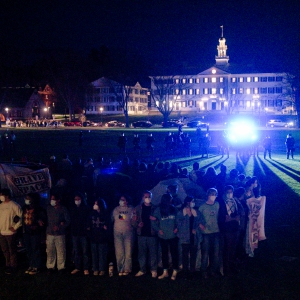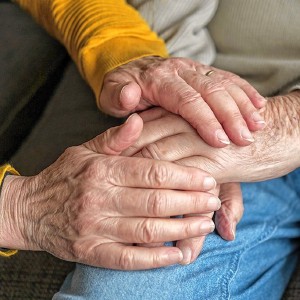Opinion: The demise of “trust me”
| Published: 07-23-2023 6:00 AM |
John Buttrick writes from his Vermont Rocker in his Concord home: Minds Crossing. He can be reached at johndbuttrick@gmail.com.
You’ll hear them from a friend, a politician, a salesperson, a business partner. They are two beguiling words: “trust me.”
They beg the question, “Oh, is there a reason why I should not trust you?” Do you have an ulterior motive? Have you been untrustworthy in the past? Are you being credible? What is your focus: politics, a specific social stratum, an institution, a business, or an international relationship?
One reason for the command, “trust me,” is that trust in our society is in short supply. Everyone seeks to be trusted while at the same time hesitating to trust others. “Trust me,” is a default for soliciting trust in a world where trust is both tricky and sparse. Difficult to acquire.
Trust is essential but it is not always dependable or reciprocal. One example is the Gallup poll in the summer of 2022 reporting that citizens’ trust in government has significantly dropped since 2000. Common Good Governing reported details of the poll. Trust in the Supreme Court has dropped to 25%, the presidency to 23%, the criminal justice system to 14%, and Congress to 7%. Pew Research has reported that only 17% of Americans expressed trust in government in 2022.
Insisting over and over, “trust me,” does not seem to work. Trust continues to erode. We need to find ways to recover trust in our neighbors, our institutions, and our government. I suggest three ways to begin.
One is to take a hard look at our approach to the history of our country and the actions of our ancestors. The country’s values and norms have evolved since the 17th century. Therefore, for example, applying contemporary values to evaluate the benefits of early colonization, dehumanization of the indigenous people, and treating slaves as a commodity, leads to discomfort and guilt.
Some believe historians ruin the good names of our ancestors and judge us as participants in their spurious actions. Therefore, they choose to mistrust historians who include the dark side of our history. The result is a denial of that part of history. Thus, the agitation expressed about teaching these aspects of history. Books are banned, people presenting uncomfortable information are silenced, and systems theories are scorned. The premise is that children will feel bad about themselves or falsely judge others.
Article continues after...
Yesterday's Most Read Articles
 Update: Reactions for, against the more than 100 arrested at Dartmouth, UNH
Update: Reactions for, against the more than 100 arrested at Dartmouth, UNH
 Franklin police arrest man after accidental shooting Wednesday
Franklin police arrest man after accidental shooting Wednesday
 Opinion: New Hampshire, it’s time to acknowledge the stories of suffering
Opinion: New Hampshire, it’s time to acknowledge the stories of suffering
 Baseball: Merrimack Valley now 6-1 following wild game at Pembroke Academy
Baseball: Merrimack Valley now 6-1 following wild game at Pembroke Academy
 Food insecurity on the rise in N.H.
Food insecurity on the rise in N.H.
 Concord High graduate leads Pro-Palestine protests at Brown Univeristy
Concord High graduate leads Pro-Palestine protests at Brown Univeristy
However, a more insightful way to approach our history is to treat it as an incentive to move forward with new values and goals. Knowing our history, the good and the bad, can motivate us to improve our behavior. A step toward a more trusting society is to trust that historians are not in the business of condemning but seeking to have their discoveries point the way toward a more just and equitable future.
A second way to increase trust in our country and communities is to be more cognizant of people who have had their trust in a friend or loved one broken. Trusting a friend is more personal and subjective than rational. Therefore, a break in that trust has a strong feeling of betrayal. It is not easy to be released from the feeling of betrayal. The longer the feeling exists, the more the betrayed grows to mistrust all people, as well as suffer wariness of institutions and governments.
To renew a sense of trust involves perceiving that the origin of the mistrust may be a past hurtful experience that will not heal with a command to “trust me.” The person lacking trust in others may discover trust again by the experience of others trusting them. Only then will mutual trust become the acceptable cutting edge of renewed healthy relationships.
Finally, trust does not originate in a vacuum. Ronald Reagan once said, “Trust but verify.” Renewing a sense of trust in relationships and in institutions involves employing humanity’s ability to reason, to learn from the past, and construct an improved future.
Build upon what is factual. Use reason and analysis to separate actual facts from fictional facts. Build a body of knowledge that can measure and evaluate a “trusted” word. With new national trust, we shall be “forming a more perfect union.” There will be no more inclination to use those two words, “trust me.”
]]>


 Opinion: A digital equity plan for Granite Staters
Opinion: A digital equity plan for Granite Staters Opinion: Look to facts in Medical Aid in Dying
Opinion: Look to facts in Medical Aid in Dying Opinion: In the debate on Medical Aid in Dying, facts matter
Opinion: In the debate on Medical Aid in Dying, facts matter
